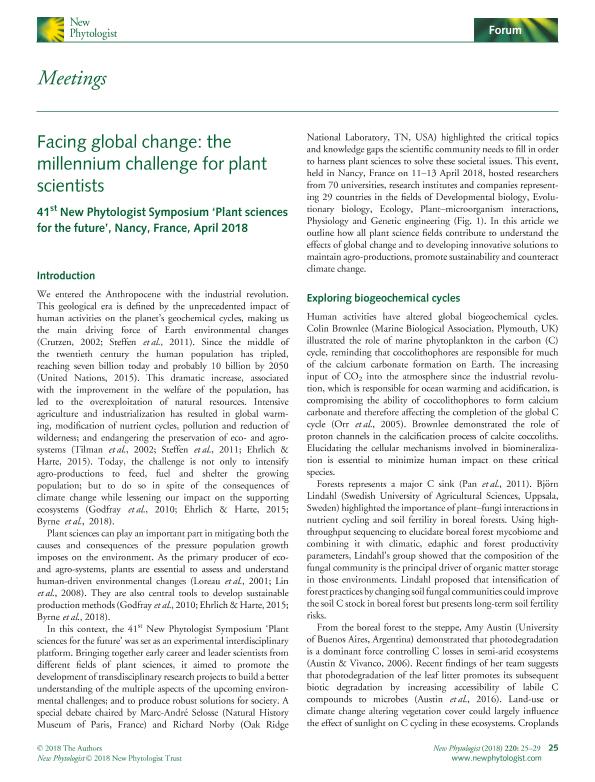Mostrar el registro sencillo del ítem
dc.contributor.author
Basso, Veronica
dc.contributor.author
De Freitas Pereira, Maíra
dc.contributor.author
Maillard, François
dc.contributor.author
Mallerman, Julieta

dc.contributor.author
Mangeot Peter, Lauralie
dc.contributor.author
Zhang, Feng
dc.contributor.author
Bonnot, Clémence
dc.date.available
2020-01-06T15:26:03Z
dc.date.issued
2018-10
dc.identifier.citation
Basso, Veronica; De Freitas Pereira, Maíra; Maillard, François; Mallerman, Julieta; Mangeot Peter, Lauralie; et al.; Facing global change: the millennium challenge for plant scientists; Wiley Blackwell Publishing, Inc; New Phytologist; 220; 1; 10-2018; 25-29
dc.identifier.issn
0028-646X
dc.identifier.uri
http://hdl.handle.net/11336/93606
dc.description.abstract
We entered the Anthropocene with the industrial revolution. This geological era is defined by the unprecedented impact of human activities on the planet's geochemical cycles, making us the main driving force of Earth environmental changes (Crutzen, 2002; Steffen et al., 2011). Since the middle of the twentieth century the human population has tripled, reaching seven billion today and probably 10 billion by 2050 (United Nations, 2015). This dramatic increase, associated with the improvement in the welfare of the population, has led to the overexploitation of natural resources. Intensive agriculture and industrialization has resulted in global warming, modification of nutrient cycles, pollution and reduction of wilderness; and endangering the preservation of eco‐ and agro‐systems (Tilman et al., 2002; Steffen et al., 2011; Ehrlich & Harte, 2015). Today, the challenge is not only to intensify agro‐productions to feed, fuel and shelter the growing population; but to do so in spite of the consequences of climate change while lessening our impact on the supporting ecosystems (Godfray et al., 2010; Ehrlich & Harte, 2015; Byrne et al., 2018). Plant sciences can play an important part in mitigating both the causes and consequences of the pressure population growth imposes on the environment. As the primary producer of eco‐ and agro‐systems, plants are essential to assess and understand human‐driven environmental changes (Loreau et al., 2001; Lin et al., 2008). They are also central tools to develop sustainable production methods (Godfray et al., 2010; Ehrlich & Harte, 2015; Byrne et al., 2018). In this context, the 41st New Phytologist Symposium ‘Plant sciences for the future’ was set as an experimental interdisciplinary platform. Bringing together early career and leader scientists from different fields of plant sciences, it aimed to promote the development of transdisciplinary research projects to build a better understanding of the multiple aspects of the upcoming environmental challenges; and to produce robust solutions for society. A special debate chaired by Marc‐André Selosse (Natural History Museum of Paris, France) and Richard Norby (Oak Ridge National Laboratory, TN, USA) highlighted the critical topics and knowledge gaps the scientific community needs to fill in order to harness plant sciences to solve these societal issues. This event, held in Nancy, France on 11–13 April 2018, hosted researchers from 70 universities, research institutes and companies representing 29 countries in the fields of Developmental biology, Evolutionary biology, Ecology, Plant–microorganism interactions, Physiology and Genetic engineering (Fig. 1). In this article we outline how all plant science fields contribute to understand the effects of global change and to developing innovative solutions to maintain agro‐productions, promote sustainability and counteract climate change.
dc.format
application/pdf
dc.language.iso
eng
dc.publisher
Wiley Blackwell Publishing, Inc

dc.rights
info:eu-repo/semantics/openAccess
dc.rights.uri
https://creativecommons.org/licenses/by-nc-sa/2.5/ar/
dc.subject
BIOCHEMICAL CYCLES
dc.subject
CLIMATE CHANGE
dc.subject
FOOD SECURITY
dc.subject
HOLOBIONT
dc.subject
PHENOTYPIC PLASTICITY
dc.subject
PLANT ADAPTIVE STRATEGIES
dc.subject
PLANT PRODUCTIVITY
dc.subject
PLANT SCIENCES
dc.subject.classification
Ciencias de las Plantas, Botánica

dc.subject.classification
Ciencias Biológicas

dc.subject.classification
CIENCIAS NATURALES Y EXACTAS

dc.title
Facing global change: the millennium challenge for plant scientists
dc.type
info:eu-repo/semantics/article
dc.type
info:ar-repo/semantics/artículo
dc.type
info:eu-repo/semantics/publishedVersion
dc.date.updated
2019-10-23T21:14:23Z
dc.journal.volume
220
dc.journal.number
1
dc.journal.pagination
25-29
dc.journal.pais
Reino Unido

dc.journal.ciudad
Londres
dc.description.fil
Fil: Basso, Veronica. Institut National de la Recherche Agronomique; Francia
dc.description.fil
Fil: De Freitas Pereira, Maíra. Institut National de la Recherche Agronomique; Francia
dc.description.fil
Fil: Maillard, François. Institut National de la Recherche Agronomique; Francia
dc.description.fil
Fil: Mallerman, Julieta. Consejo Nacional de Investigaciones Científicas y Técnicas. Oficina de Coordinación Administrativa Parque Centenario. Instituto de Investigaciones Fisiológicas y Ecológicas Vinculadas a la Agricultura. Universidad de Buenos Aires. Facultad de Agronomía. Instituto de Investigaciones Fisiológicas y Ecológicas Vinculadas a la Agricultura; Argentina
dc.description.fil
Fil: Mangeot Peter, Lauralie. Institut National de la Recherche Agronomique; Francia
dc.description.fil
Fil: Zhang, Feng. Institut National de la Recherche Agronomique; Francia
dc.description.fil
Fil: Bonnot, Clémence. Institut National de la Recherche Agronomique; Francia
dc.journal.title
New Phytologist

dc.relation.alternativeid
info:eu-repo/semantics/altIdentifier/url/http://doi.wiley.com/10.1111/nph.15376
dc.relation.alternativeid
info:eu-repo/semantics/altIdentifier/doi/http://dx.doi.org/10.1111/nph.15376
Archivos asociados
